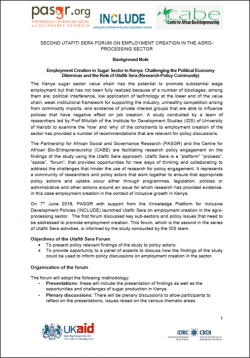
The Kenya sugar sector value chain has the potential to promote substantial wage employment but that has not been fully realized because of a number of blockages; among them are: political interference, low application of technology at the lower end of the value chain, weak institutional framework for supporting the industry, unhealthy competition arising from commodity imports, and existence of private interest groups that are able to influence policies that have negative effect on job creation. A study conducted by a team of researchers led by Prof Mitullah of the Institute for Development Studies (IDS) of University of Nairobi to examine the ‘how’ and ‘why’ of the constraints to employment creation of the sector has provided a number of recommendations that are relevant for policy discussions.
The Partnership for African Social and Governance Research (PASGR) and the Centre for African Bio-Entrepreneurship (CABE) are facilitating research policy engagement on the findings of the study using the Utafiti Sera approach.
Utafiti Sera is a “platform” “process”, “space”, “forum”, that provides opportunities for new ways of thinking and collaborating to address the challenges that hinder the use of research for policy engagement. It represents a community of researchers and policy actors that work together to ensure that appropriate policy actions and uptake occur either through programmes, legislation, policies or administrative and other actions around an issue for which research has provided evidence, in this case employment creation in the context of inclusive growth in Kenya.
On 7th June 2016, PASGR with support from the Knowledge Platform for Inclusive Development Policies (INCLUDE) launched Utafiti Sera on employment creation in the agro-processing sector. The first forum discussed key sub-sectors and policy issues that need to be addressed to promote employment creation. This forum, which is the second in the series of Utafiti Sera activities, is informed by the study conducted by the IDS team.








